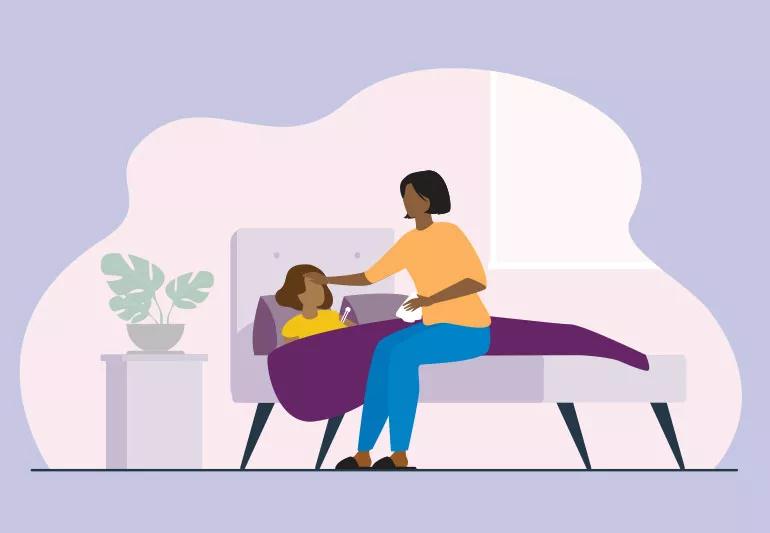Changes to the virus cycle put more importance on taking proper precautions

Image content: This image is available to view online.
View image online (https://assets.clevelandclinic.org/transform/3d3b2557-057c-470f-8731-5865cc748780/childSickMomIllust-1283832886-770x533-1_jpg)
Child sick in bed with caregiver
Respiratory syncytial virus (RSV) seems to have a new season. Cases of the illness — which traditionally peak during fall and winter — have once again increased over summer. The bump this year followed a massive spike in 2021.
Advertisement
Cleveland Clinic is a non-profit academic medical center. Advertising on our site helps support our mission. We do not endorse non-Cleveland Clinic products or services. Policy
The calendar shift in the virus cycle appears to be an aftereffect of the COVID-19 pandemic. Whatever the reason, though, what’s happening is a matter of concern.
RSV is highly contagious and is particularly prevalent among children. An earlier outbreak adds complications to the start of a new school year already dealing with more contagious COVID-19 variants.
To better understand what RSV is and how to protect children and yourself from the virus, we spoke with pediatric infectious disease expert Camille Sabella, MD.
RSV is a seasonal respiratory virus that’s highly contagious and mostly affects children. While adults can also develop RSV infections, it’s most common and severe among young children — especially those under 2 years of age.
Serious cases can cause respiratory distress or failure and even develop into pneumonia.
Symptoms in infants can include:
In older children and adults, symptoms are typically similar yet milder. “The older you are, the better the chance that you’ve had it before — so there’s some protection provided even if you’re still susceptible to infection,” explains Dr. Sabella.
Advertisement
Additional RSV symptoms for older children and adults may include:
RSV previously followed a predictable timeline: As the calendar flipped to fall and winter months, healthcare providers in much of the United States would begin seeing people with the telltale wheeze of the respiratory virus.
That changed in 2020, when RSV almost completely disappeared as COVID-19 restrictions kept people masked or at home.
But when restrictions lifted in 2021 and people started going out more, RSV roared back with a summer outbreak. A smaller yet still out-of-the-ordinary summer jump in cases took place this year, according to data from the Centers for Disease Control and Prevention (CDC).
“It’s a bit of a different phenomenon,” says Dr. Sabella. “We usually don’t start seeing RSV rising until November or December, so this has been very unusual.”
And while there are theories as to why the summer surges have taken place, it’s still largely unknown why the once predictable RSV virus is now spreading during a different time of the year.
Most people who become infected with RSV are contagious for three to eight days, according to the CDC. However, some infants and people with weakened immune systems can spread the virus up to four weeks after symptoms stop.
Part of why RSV is so common among children is how it’s passed around, notes Dr. Sabella. Not only can you catch it from infected droplets in the cough or sneeze of a person who’s infected, but the virus also lives on surfaces and objects.
It’s incredibly easy to become infected simply by touching a doorknob that has the virus and then touching your face before washing your hands. While the virus may not live on your hands for very long, it can live on surfaces for hours at a time.
Because RSV is so contagious and easy to pass around, anything you can do to help protect your children — and yourself — is key. Here are five precautions you can take to keep RSV at bay:
Advertisement
Unfortunately, there isn’t a specific vaccine to prevent RSV in children. The FDA recently approved an RSV vaccine for adults 60 or older.
However, children under the age of 24 months with certain lung or heart conditions may benefit from a monthly preventive injection of monoclonal antibodies (a medicine known as SYNAGIS) that can reduce the risk of severe RSV lung infections.
Other than that, care for RSV primarily mainly focuses on lessening symptoms through supportive treatments like hydration or oxygen therapy if oxygen levels are low. Hospitalization is possible if RSV leads to respiratory distress or pneumonia.
“But beyond all of that, it’s mostly just letting the virus run its course,” says Dr. Sabella.
Because RSV and COVID-19 share similar symptoms, many parents might be concerned about differentiating between the two. Unfortunately, says Dr. Sabella, there’s no way of knowing for sure without getting a test.
“It’s very difficult to distinguish COVID-19 from RSV or other respiratory viruses like the flu without specific testing,” he says. “Fortunately, most children with RSV or COVID-19 experience relatively mild symptoms.”
Your best move? Call your family’s pediatrician or a healthcare provider if your child has difficulty breathing or symptoms linger or get worse after five days.
Advertisement

Sign up for our Health Essentials emails for expert guidance on nutrition, fitness, sleep, skin care and more.
Learn more about our editorial process.
Advertisement
Infants are at high risk of severe RSV, but getting the vaccine during pregnancy helps protect them from it
RSV can lead your child to develop pneumonia and have trouble breathing
Getting extra rest, drinking fluids and taking over-the-counter medications can help your little one bounce back
The first year of the RSV immunization program brought promising results
Respiratory syncytial virus spreads easily through respiratory droplets spewed out by those who are infected
It comes down to a wheeze, a fever and long-term effects
Adults 60 or older, pregnant women and babies may be eligible for protection against RSV
Taking extra precaution during RSV season can be lifesaving
Prioritize your health by managing stress, strengthening your social connections and getting quality sleep
Bolsters, blankets, pillows and blocks can offer extra support, stability and comfort
Allergies, postnasal drip, asthma or reflux could be to blame for a cough that won’t quit